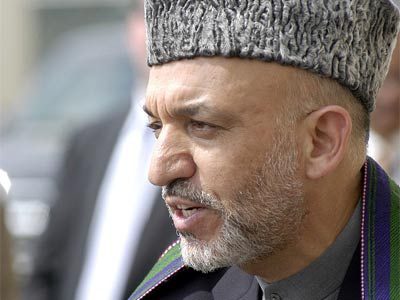Karzai's Rant
The Afghan leader's regular denunciations are a reminder of how easy it is to misinterpret American motives.
 Several explanations can account for Afghan President Hamid Karzai's outburst this week, in which he accused the United States of in effect working in parallel with the Taliban by keeping Afghanistan unstable and thereby having an excuse to keeping U.S. troops there indefinitely. Karzai has vented with increasing frequency and openness over the past couple of years about various aspects of the U.S. and allied military presence and operations in his country. When he does this he is speaking more to his own citizens than anyone else, as part of an effort to insulate himself politically from everything that is unpopular about foreign soldiers and his government's dependence on them. An immediate point of friction evidently was disagreement over the terms of handing over a detention facility to Afghan control.
Several explanations can account for Afghan President Hamid Karzai's outburst this week, in which he accused the United States of in effect working in parallel with the Taliban by keeping Afghanistan unstable and thereby having an excuse to keeping U.S. troops there indefinitely. Karzai has vented with increasing frequency and openness over the past couple of years about various aspects of the U.S. and allied military presence and operations in his country. When he does this he is speaking more to his own citizens than anyone else, as part of an effort to insulate himself politically from everything that is unpopular about foreign soldiers and his government's dependence on them. An immediate point of friction evidently was disagreement over the terms of handing over a detention facility to Afghan control.
It would be easy to blow this off as just Afghan politics. It also would be easy to brush aside the illogical aspects of Karzai's remarks. This included some of what he said about negotiations, including his comments concerning alleged separate talks (which U.S. officials quickly denied) between the United States and the Taliban. We nonetheless ought to reflect on why the Afghan leader evidently considers it good politics to say the things he said.
The episode illustrates the near-inevitability of significant friction and resentment among the locals from prolonged military operations, no matter how well those operations may have been received earlier (as indeed the intervention in Afghanistan was received earlier by many Afghans). It also illustrates how easily the motives behind such operations get misunderstood, in ways that no amount of public diplomacy or public statements can correct. The U.S. military commander and the U.S. ambassador were speaking for nearly all Americans when both noted how preposterous it was, given the sacrifices the United States had made over the past twelve years on behalf of Afghanistan (and on behalf of Karzai's government), that it would intentionally keep Afghanistan unstable to provide an excuse for staying there even longer. The very preposterousness of the idea demonstrates the strength of the tendency toward misinterpretation of motives.
In the United States, the issue of what sort of presence might continue in Afghanistan beyond next year appears to be in flux. Especially given Karzai's most recent comments, there is an emerging similarity to what happened at the end of America's war in Iraq. The Bush administration negotiated an agreement with the Iraqi government to pull out entirely. Then there was more discussion in this country about whether a total pull-out was a good idea. The Obama administration raised—half-heartedly, according to its American critics—with the Iraqis the possibility of revising the agreement. Iraqi resistance to a revision was strong enough that the original agreement stayed in place. That was good, but it opened the door to perpetual second-guessing among those in this country who contend that the Iraq War could have been a win if we had played our cards a little better.
There are major differences between the American war in Afghanistan and the one in Iraq, especially in how they began and why they were ever fought at all. In Afghanistan the United States missed a chance to declare a win once the Taliban were ousted from power and their al-Qaeda allies were rousted from the country. But with occupation and counterinsurgency dragging on, there has been a convergence in some characteristics of the two expeditions. The final point of convergence may be the perpetual second-guessing that appears likely to take place with Afghanistan, too, about the U.S. presence that will or will not be left behind and how things might have come out differently with a different presence.
